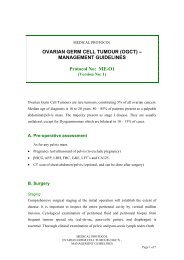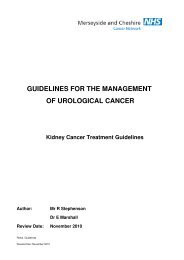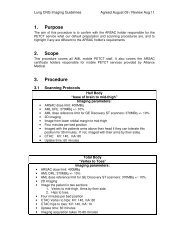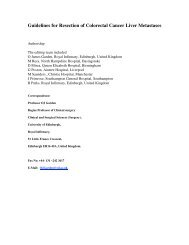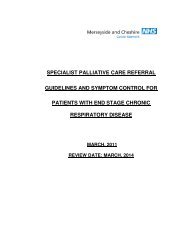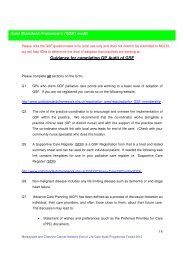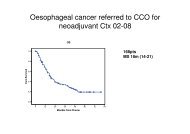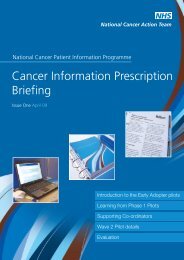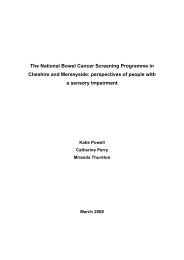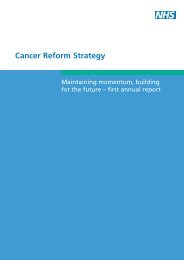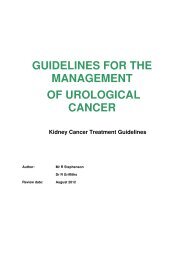Cancer Reform Strategy - NHS Cancer Screening Programmes
Cancer Reform Strategy - NHS Cancer Screening Programmes
Cancer Reform Strategy - NHS Cancer Screening Programmes
- No tags were found...
You also want an ePaper? Increase the reach of your titles
YUMPU automatically turns print PDFs into web optimized ePapers that Google loves.
106 CANCER REFORM STRATEGY●Clinical outcomes, including survival, withadjustments for co-morbidity and stage ofdisease.8.3 This chapter sets out in more detail how wewill improve the data available to patients,commissioners and service providers, as well asthe steps we are taking to ensure that the datawe already collect is used to improve outcomes.Information on awareness of andattitudes to cancer8.4 Chapter 2 highlighted the low levels ofpublic awareness of preventable risk factors forcancer. Chapter 3 drew attention to the linkbetween late presentation by patients withcancer and failure to recognise that symptomsare serious or could be due to cancer.8.5 Robust data on levels of awareness of riskfactors and symptoms is needed to highlightgroups in whom awareness raising initiatives arelikely to be of greatest benefit. Surveys will alsobe needed to monitor the impact of suchinitiatives.8.6 As discussed in chapters 2 and 3 <strong>Cancer</strong>Research UK is currently developing a cancerawareness survey tool. Once this has beenpiloted, the Department of Health willinitiate the first ever national survey. This islikely to be in late 2008 or 2009. The surveywill then be repeated at least every twoyears, enabling us to track progress.8.7 The awareness survey tool will also beavailable to use at a local level, where it will bepossible to gain more detailed insights intovariations in awareness and attitudes withinlocal communities.Information on the experience ofpatients8.8 Chapter 5 sets out the measures we aretaking to build on the progress made inimproving patients’ experience of theirtreatment and care.8.9 A new cancer patient experience survey toolwill be developed. This will build on experiencefrom the previous cancer patient surveysundertaken in 2000 and 2004 and recent workto develop a specific survey tool for patientswith prostate cancer. The survey tool will coveraspects of care highlighted in chapter 5 as beingof great importance to patients, including thequality of:●●●Face to face communication;Information about their condition,treatments, services, financial benefits etc;andCoordination of care.8.10 Surveys of cancer patient experiencewill then be undertaken annually.These will be of sufficient size to providemeaningful data on the experience ofpatients with specific cancers in differenthospitals. It is likely that some tumour siteswill be covered in one year and others insucceeding years.8.11 The findings of these surveys will be madepublic. Individual patients may wish to takeaccount of these findings in choosing wherethey wish to be treated. Local user involvementgroups will also wish to use the results to focuson areas where service improvement is mostneeded. Commissioners and providers will wishto use the results of patient experience survey todrive up quality.Information on clinical outcomes8.12 Collecting information on clinicaloutcomes can in itself be a key driver forimprovements in quality. For example, collectionof information on service quality has been ahallmark of the <strong>NHS</strong> Breast <strong>Screening</strong>Programme. Feedback to service providers hasbeen associated with year on year improvementsin service quality.8.13 A considerable amount of information onindividual cancer patients is already collected bycancer registries, through Hospital EpisodeStatistics (HES) and other national data sources.Attempts have been made to collect outcomesdata through national clinical audits, but not allhospitals have submitted to these, resulting in



